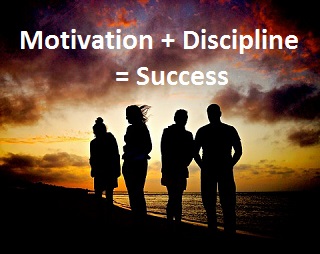Our previous article was Keys to Successful Habit Change. GPA (Goals, Plans and Action steps) are critical to habit change. This article explores some ways to make your plans work. When you are talking about habit formation, your most powerful tools are Motivation and Self-Discipline.
Motivation
Motivation is a force that makes you willing to do something.
“You don’t need much motivation once you’ve started a behavior. Nearly all of the friction in a task is at the beginning. After you start, progress occurs more naturally. Thus, one of the keys to getting motivated is to make it easy to start.” – James Clear
The first step is the hardest, but chances are you feel pumped-up, excited, and full of plans for great changes. Your motivation is full throttle. In all likelihood, you will do well the first few weeks.
Relying on motivation alone to get us to our goal will probably not work. You need both motivation and self-discipline. Your reason for eating better or exercising might remain. However, your willingness to continue to work out, or eat healthy is relying on those motivational emotions; and emotions are unpredictable.
“Excitement, desire, willingness – these positive emotions one feels in anticipation of a task are fleeting, lasting for only 3 to 6 weeks. As the task becomes a habit, people lose the emotional attachment, and the work becomes work.” – lifeoptimizer.org
Think of a rocket heading into space. The first stage thruster engine is like motivation. It gets us started and can even finish short-term projects fast and strong. If we are undertaking long-term goals or changing our well-established habits, motivation can only get us started. To get through the long journey, you need a booster engine. We need discipline.

Self-Discipline
Self-discipline the ability to control your feelings, overcome weaknesses and do the right thing despite temptation.
You will not be 100% successful. You are going to fail on some days. This self-discipline journey is not going to be a smooth. However, it is do-able if you concentrate on the big picture. On the other hand, expecting perfection can cause you to feel guilty. And that could lead you to quit.
“Failure isn’t final until you quit!” – Steven Furtick
Self-discipline is uncomfortable and it’s not easy. Making a new habit takes a while, but it will eventually become assimilated into your life, and it does get easier. You do it every day and every day it gets a little bit easier.
Motivation and Self-Discipline: Tips for Success
1. Record your achievable goals.
You are 42% more likely to achieve your goals if you write them down. Remember, your goals should be achievable. Action steps should begin small and build. Successful, small tasks will help you build the self-discipline you will need to take on bigger goals.
2. Enjoy the motivation balloon.
It is glorious but short-lived. Make the most of it. Achieve your targets. Savor the feeling. It won’t last, but it will launch you.
3. Schedule realistically.
Be honest with yourself. Establishing a new habit isn’t about changing who you are, it’s integrating something new. Make YOUR changes doable.
4. See the big picture.
Keep the end in sight. Motivation only launches you toward your goal. Visualizing what you want to accomplish will help if your self-discipline falters. Your brain does not differentiate between real and imagined memories. See it. Be it.
5. Falter, Fail, Forgive.
You are going to falter and fail. After all, you are just a human. If you don’t forgive yourself it makes it hard to move on. Don’t accept defeat. You can lose a battle and still win the war. First, review your goal and action steps. Then forge ahead again.
6. Reward a good job.
Success may be its own reward. But if you want your good habits to stick, studies show the key is rewarding yourself along the way. Whenever you complete a step toward your goal, acknowledge it. Pat yourself on the back. Feel the victory. Deprivation can lead to making unplanned bad choices. Treat yourself throughout your self-discipline practice. Doing so will help you feel energized, restored, and never deprived.
7. Practice self-care.
Part of self-discipline is taking care of yourself. You should “eat to live” (not “live to eat.”) Healthy snacks and meals keep your blood sugar constant and your energy level high. It’s easier to manage emotions and maintain self- discipline if your body is nourished. Practicing mindful meditation a few minutes every day can build up your “little gray cells” in the area of your brain associated with decision-making and emotion regulation. Things like taking a short walk, noticing five things around you, or identifying two smells can actually increase concentration. Sleeping for at least 7 hours a night can keep your prefrontal cortex in good shape. It help you maintain the clear thinking essential for self-discipline. Adequate sleep also helps with handling emotions, processing complex thoughts, and solving problems.
8. Get a partner.
They can help, acknowledge, cheer you on and keep you grounded. Your partner might be a professional like a coach or counselor. Maybe you have a mentor in your life. Or, perhaps you could enlist a good and trusted friend. Problems shared are problems halved.
With goals, plans and action steps, using motivation and self-discipline, we can establish new habits. With new habits, we will change our lives.
“We are what we repeatedly do. Excellence, then, is not an act but a habit” – Aristotle
PS. You might want to check out our new quick Self-Discipline Test.
* Please leave a comment below. You may comment anonymously or you may use your first name. We may post or quote your comment on the website. We will never post or share your last name, email address or any other personal identifying information.
